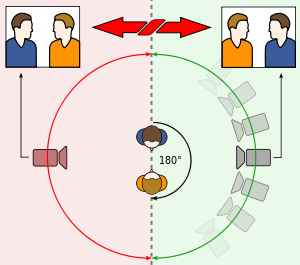
In film making, the 180-degree rule, is a basic guideline regarding the on-screen spatial relationship between a character and another character or object within a scene. An imaginary line called the axis connects the characters and by keeping the camera on one side of this axis for every shot in the scene, the first character will always be frame right of the second character, who is then always frame left of the first. If the camera passes over the axis, it is called crossing the line or jumping the line.
Problem caused and Solutions
The
180-degree rule enables the audience to visually connect with unseen movement
happening around and behind the immediate subject and is important in the
narration of battle scenes. The visual disjointedness of the battle scene on Geonosis in the Star Wars film Attack of the
Clones is an example.[2]
Avoiding crossing the line is a problem that those
learning film-craft will need to struggle with. In the above example with the
car chase, a possible solution is to begin the second cut with the car driving
into frame from the "wrong" side. Although this may be wrong in the geographic
sense on set, it looks more natural to the viewer. Another possibility is to
insert a "buffer shot" of the subject head-on (or from behind) to help the
viewer understand the camera movement.
The 180 degree rule has to be adhered to and is put in place to avoid confusion for the audience. If you were to abandon the 180 degree rule, then it would seem as if the character has changed position. As the graph above shows, anywhere in the green shaded area can be filmed from but if the camera were to go into the red shade area, then it would seem as if the two characters have switched positions, exactly same with the other picture you can also see the okay zones and wrong zones.
No comments:
Post a Comment